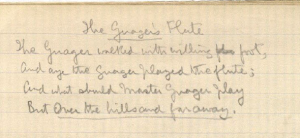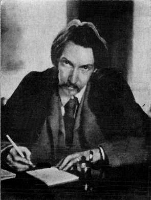Posts Tagged ‘A Song of the Road’
More on Stevenson’s music
The Inland Voyage Notebook

Yale, GM 664 box 3 folder 851, Inland Voyage Notebook (Notebook 27/A), opp. numb. p. 27; part of ‘The Guager’s Flute’
The ‘Inland Voyage’ Notebook gives an idea of an amazing period of literary activity and inventiveness for RLS: not only does it contain the complete first draft of An Inland Voyage, something new in travel writing, but also notes for what became The New Arabian Nights, stories that appeared immediately as startlingly modern and irreverent, and for Edinburgh: Picturesque Notes, another original work with a a distinctive, idiosyncratic voice.
On the last page of the Notebook, among the notes for Edinburgh: Picturesque Notes is the single word ‘Guager’ [sic] as a reminder of the story about the excise officer (gauger) who played ‘Over the Hills and Far Away’ on his flute as a warning as he approached his friend’s distillery. This must have stimulated RLS to compose (or recover and rewrite) ‘The Gauger’s Flute’ on another page, which then becomes ‘A Song of the Road’ in Underwoods. In the published version, the place of composition is added at the bottom ‘Forest of Montargis, 1878’, a place near Fontainebleau where RLS stayed in August 1878 before leaving for a journey associated with another outstanding work, Travels with a Donkey in the Cevennes.
Lewis (Collected Poems, 397-99) gives information about the four manuscripts and an idea about history of composition, but as for the quotation ‘Over the hills and far away’, the only information he supplies is that it is ‘the refrain of a popular song’.
The Music of Robert Louis Stevenson
Now anyone wanting to find out more about the song and its relation to Stevenson’s poem can consult John Russell’s site The Music of Robert Louis Stevenson (aptly abbreviated as MORLS). Here, he deftly establishes the exact version that RLS would have been mentally referring to as he wrote. In fact, the poem not only quotes the song but is ‘in lockstep’ syllable-by-syllable with the Jacobite version published in James Hogg’s Jacobite Relics of Scotland.
